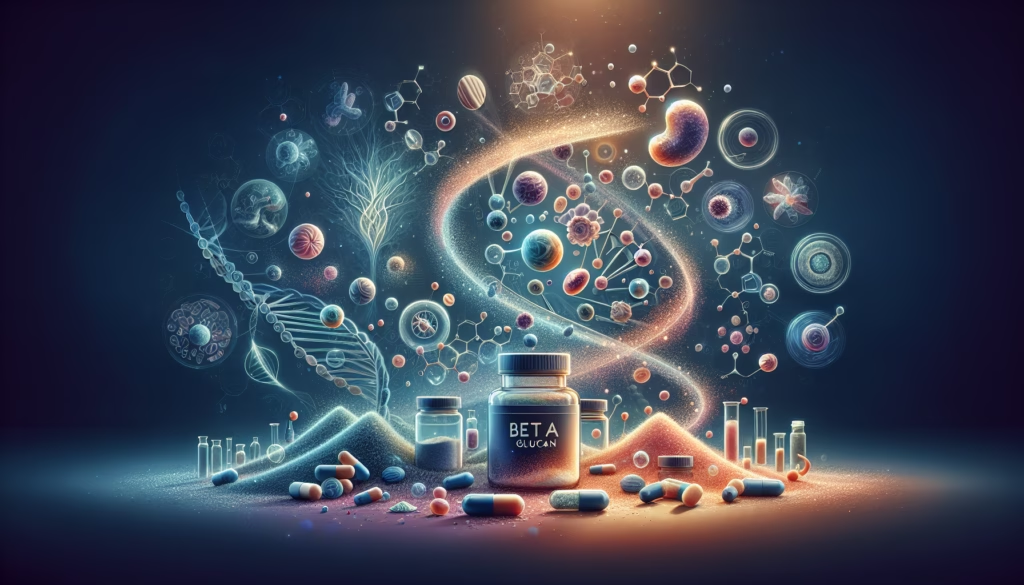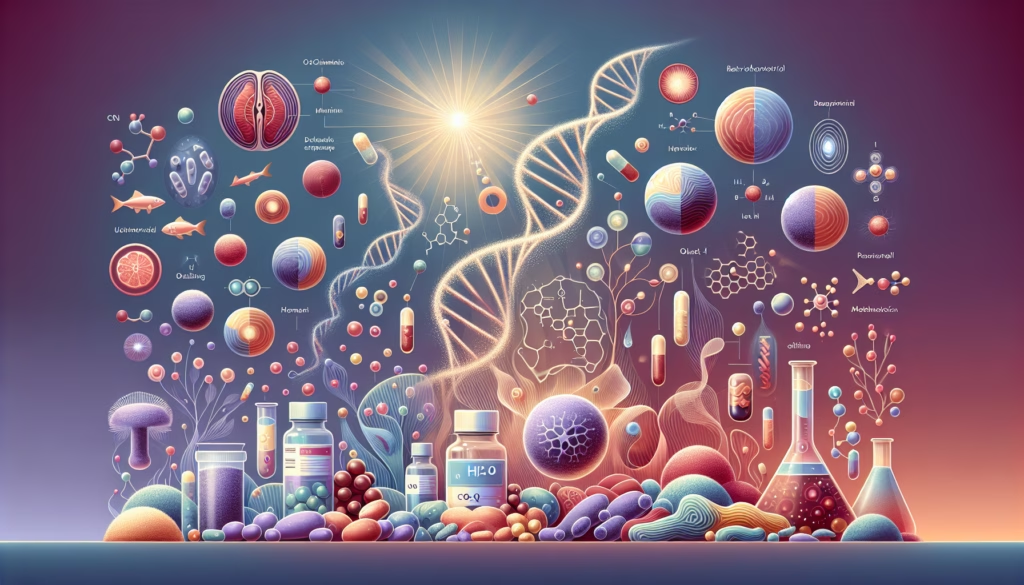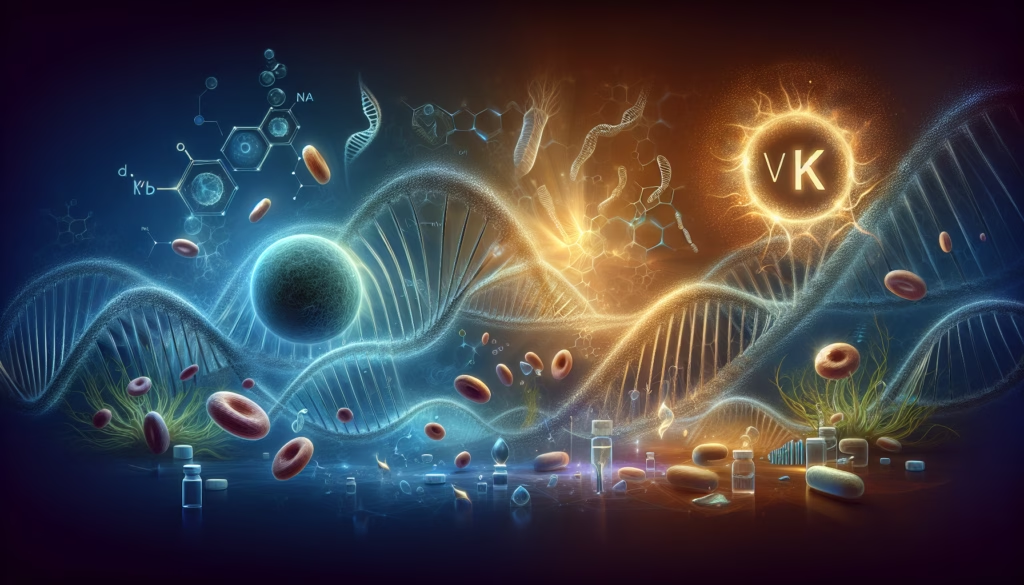
Beta Glucan
Discover the science-backed potential of beta glucan as an adjunct in cancer therapy. This post delves into the latest research
Click 
Apigenin is a naturally occurring compound that has been studied extensively for its anti-inflammatory, antioxidant, and anticancer effects. It is commonly found in citrus fruits, vegetables, and certain herbs. The anticancer activity of apigenin is attributed to its ability to modulate various molecular pathways involved in cancer cell proliferation, apoptosis, and metastasis.
Anticancer Mechanisms of Apigenin
Cell Cycle Arrest and Apoptosis: Apigenin induces cell cycle arrest at different phases, such as G0/G1, S, and G2/M, depending on the cancer cell type and concentration used. It promotes apoptosis by activating caspases and modulating proteins involved in cell survival and death pathways16.
Inhibition of Metastasis: Apigenin suppresses metastasis by down-regulating matrix metalloproteinases (MMPs) and modulating signalling pathways like the PI3K/Akt pathway. This reduces cancer cell migration and invasion14.
Angiogenesis Inhibition: Apigenin exhibits anti-angiogenic properties by inhibiting vascular endothelial growth factor (VEGF) and other angiogenic factors, which are crucial for tumor growth and metastasis56.
Modulation of Signaling Pathways: Apigenin affects several key signaling pathways involved in cancer, including PI3K/Akt, MAPK/ERK, NF-κB, and STAT3. These pathways are crucial for cancer cell proliferation, survival, and metastasis78.
Apigenin has been shown to enhance the efficacy of certain chemotherapeutic agents. It can sensitise cancer cells to chemotherapy by inducing cell cycle arrest and apoptosis, making it a potential adjuvant therapy3.
Preclinical studies have demonstrated apigenin’s ability to suppress tumour growth and metastasis in various animal models, including prostate, breast, colon, and pancreatic cancers24. While clinical trials are limited, the available data suggest that apigenin could be a valuable adjunct in cancer therapy due to its low toxicity and potential synergistic effects with conventional treatments.
Apigenin’s anticancer properties make it a promising compound for cancer prevention and treatment. Its ability to modulate multiple pathways involved in cancer progression and its potential to enhance chemotherapy efficacy highlight its therapeutic potential. Further research is needed to fully explore its clinical applications and to understand its effects in human subjects.
There is no officially recommended safe dosage for apigenin, as it is a supplement and not a regulated medication. However, studies and supplements typically use dosages ranging from 50 mg to 500 mg per day for various health benefits, including relaxation and antioxidant support134. For sleep support, doses as low as 2.5 mg have been used, while 50-150 mg is more common17. It is generally considered safe, even at high doses, but high intake may lead to side effects like drowsiness or stomach upset236. It is advisable to start with a lower dose and adjust as needed, consulting a healthcare provider if necessary15.
Breast Cancer, Colorectal Cancer, Leukemia, Lung Cancer, Pancreatic Cancer
Apigenin is generally considered safe when consumed in normal dietary amounts, but it can cause side effects, especially at higher doses or when used as a supplement.
Here are some potential side effects and considerations:
Digestive Issues: Higher doses of apigenin may lead to nausea, stomach upset, or other digestive discomforts16.
Medication Interactions: Apigenin can interact with certain medications, such as blood thinners, blood pressure medications, and some cancer treatments, by affecting liver metabolism. This could lead to increased side effects or reduced efficacy of these medications1.
Hormone-Sensitive Conditions: Apigenin may mimic oestrogen, which could impact conditions like breast cancer or endometriosis. Individuals with these conditions should approach apigenin with caution and consult a healthcare provider1.
Allergic Reactions: Some people may experience allergic reactions to apigenin, particularly if they are sensitive to chamomile tea or other sources of apigenin6.
Headaches and Migraines: Despite apigenin’s potential benefits for migraines, some individuals report experiencing headaches or migraines after taking it, possibly due to individual sensitivities4.
Liver Toxicity: High doses of apigenin have shown liver toxicity in animal studies, highlighting the importance of moderation and monitoring liver health if using high doses2.
If you experience any side effects, it is advisable to adjust your dosage or consult a healthcare professional.
Research on Apigenin in combination therapies is ongoing and shows promising results. Some studies suggest potential synergistic effects when combined with conventional chemotherapy agents, potentially enhancing their efficacy while reducing side effects. Key findings include:
1. Enhanced effectiveness of cisplatin in lung cancer models
2. Improved response to paclitaxel in ovarian cancer cells
3. Synergistic effects with 5-fluorouracil in colorectal cancer studies
Additionally, some research indicates that Apigenin may sensitize resistant cancer cells to certain treatments, potentially overcoming drug resistance. However, these findings are primarily from preclinical studies and early-phase clinical trials. Further robust clinical research is needed to establish definitive conclusions about the safety and efficacy of Apigenin in combination therapies for cancer treatment.
US National Library of Medicine research on Apigenin
Europe PMC research on Apigenin
Pubmed research on Apigenin
Apigenin may have a significant impact on quality of life due to its diverse health benefits.
Here are some potential ways apigenin could improve quality of life:
Improved Sleep Quality:
Reduced Anxiety and Stress:
Enhanced Brain Function:
Heart Health:
Pain Relief:
Immune System Support:
Hormonal Balance:
Anti-Aging Effects:
While these benefits are promising, it’s important to note that the majority of evidence comes from preclinical studies, and more human clinical trials are needed to fully understand apigenin’s impact on quality of life.
We’ve done our best to include as much information as possible for this supplement.
If you have any other questions, please send us a message or join our Skool Group and ask our knowledgeable and friendly community.
Apigenin is generally available as a dietary supplement in health food stores and online retailers. Its regulatory status and accessibility may vary depending on the country. In the US, it’s classified as a dietary supplement and is widely available. In the EU, regulations on novel foods may affect its availability in some countries.
Most studies have included adult cancer warriors (18+ years). Both male and female subjects have been included in various cancer type studies. Limited data is available on ethnic diversity in Apigenin-specific trials. More diverse and representative patient populations in future clinical trials will be crucial for understanding Apigenin’s efficacy across different demographic groups.
Apigenin has demonstrated potential in overcoming certain drug resistance mechanisms in cancer cells. It achieves this by inhibiting the STAT3 signaling pathway and downregulating efflux pumps like P-glycoprotein (P-gp), which are responsible for pumping drugs out of cells and contributing to multidrug resistance147. Additionally, apigenin induces cell cycle arrest at various stages (G0/G1, S, G2/M), preventing cancer cells from progressing through the cell cycle, which can help overcome resistance mechanisms5.
However, the potential resistance mechanisms to apigenin itself are not fully understood and require further research.
Based on its known mechanisms of action, potential resistance mechanisms might include:
Upregulation of Efflux Pumps:
Cancer cells could develop resistance by upregulating efflux pumps that remove apigenin from cells, similar to how they develop resistance to other chemotherapeutic agents.
Mutations in Target Pathways:
Activation of Alternative Survival Pathways:
Cells might activate alternative survival pathways to bypass the inhibitory effects of apigenin. For instance, if apigenin inhibits one pathway, cells could compensate by activating another pathway that promotes survival.
Changes in Cellular Metabolism:
Changes in cellular metabolism could reduce sensitivity to apigenin’s effects. For example, alterations in glucose metabolism or other metabolic pathways might affect how cells respond to apigenin’s metabolic impacts.
Apigenin also induces apoptosis in cancer cells, which can be enhanced when combined with autophagy inhibitors, as autophagy sometimes acts as a survival mechanism for cancer cells3. Understanding these potential resistance mechanisms is crucial for developing strategies to overcome them and maximise apigenin’s therapeutic potential. Further research is needed to fully elucidate these mechanisms and to explore how they might be addressed in cancer treatment.
Apigenin has demonstrated significant potential in preclinical studies for its anticancer effects.
Key findings include:
Inhibition of Cell Proliferation: Apigenin has been shown to inhibit cell proliferation in various cancer cell lines, including breast, colon, lung, and prostate cancers. For example, it induces cell cycle arrest and suppresses the expression of cyclins and cyclin-dependent kinases, which are crucial for cell cycle progression2810.
Induction of Apoptosis: Apigenin induces apoptosis in leukaemia and pancreatic cancer cells by modulating pro-apoptotic and anti-apoptotic proteins, such as Bcl-2 family members123. This action is often mediated through caspase-dependent pathways and the intrinsic mitochondrial pathway3.
Reduction of Tumour Growth and Metastasis: In animal models, apigenin has been shown to reduce tumour growth and metastasis. It achieves this by modulating pathways involved in epithelial-to-mesenchymal transition (EMT), matrix metalloproteinases (MMPs), and angiogenesis4. For instance, apigenin inhibits MMP2 and MMP9, which are involved in cancer cell migration and invasion4.
Synergistic Effects with Chemotherapy: Apigenin can enhance the efficacy of conventional chemotherapy drugs by sensitizing cancer cells to apoptosis and cell cycle arrest. It also downregulates efflux pumps like P-glycoprotein, which can contribute to multidrug resistance12.
Modulation of Inflammatory and Immune Responses: Apigenin exhibits anti-inflammatory properties by inhibiting pathways such as NF-κB and MAPK, which are involved in inflammation611. Additionally, it modulates immune responses by enhancing the activity of natural killer (NK) cells and other immune cells, potentially boosting antitumor immunity7.
While these preclinical studies provide valuable insights into apigenin’s mechanisms of action, it is crucial to conduct rigorous clinical trials to translate these findings into effective human cancer treatments. The results from preclinical studies do not always directly translate to human outcomes, emphasising the need for further research to fully explore apigenin’s therapeutic potential.
Information on active clinical trials can be found on ClinicalTrials.gov.
Research on specific genetic markers related to Apigenin response is limited but growing.
Polymorphisms in Genes Involved in Flavonoid Metabolism:
Genes like UGT1A1 are involved in the metabolism of flavonoids, including apigenin. Variations in these genes could potentially affect how apigenin is metabolized in the body, influencing its efficacy or bioavailability. For example, apigenin has been shown to induce UGT1A1 transcription, which could be influenced by genetic polymorphisms in this gene1.
Variations in Genes Related to Pathways Apigenin Targets:
Potential Interactions with Cancer-Related Gene Mutations:
Apigenin interacts with genes like p53, which is crucial in cancer cell regulation. Variations or mutations in p53 could affect how apigenin induces apoptosis or cell cycle arrest in cancer cells36. Similarly, interactions with other cancer-related genes like BRCA might influence apigenin’s effectiveness in cancer prevention or treatment, although specific research on BRCA interactions is limited.
While these areas are under investigation, more research is needed to fully understand how genetic markers influence apigenin’s efficacy and potential side effects. This could lead to more personalised approaches in using apigenin for cancer prevention or treatment.

Discover the science-backed potential of beta glucan as an adjunct in cancer therapy. This post delves into the latest research

Explore the emerging world of hydrogen gas (H₂), also known as Brown Gas, and its remarkable potential as an adjunct

Explore the latest scientific insights into vitamin K2 and its promising role in cancer therapy. In this comprehensive blog post,
Apoptosis, or programmed cell death, is a natural process where cells self-destruct when they are damaged or no longer needed. This is crucial for maintaining healthy tissues and preventing diseases like cancer.
Drugs and supplements that induce apoptosis help eliminate cancerous cells by triggering this self-destruct mechanism, ensuring that harmful cells are removed without damaging surrounding healthy tissue.
Understanding and harnessing apoptosis is vital in the fight against cancer, as it targets the root cause of the disease at the cellular level.
Cell proliferation is the process by which cells grow and divide to produce more cells. While this is essential for growth and healing, uncontrolled cell proliferation can lead to cancer.
Drugs and supplements that inhibit cell proliferation help prevent the rapid multiplication of cancerous cells, slowing down or stopping the progression of the disease.
By targeting the mechanisms that drive cell division, these treatments play a vital role in controlling and potentially eradicating cancer.
Cancer cells often hijack specific biological pathways to grow and spread. Drugs and supplements that target these pathways can disrupt the cancer cell’s ability to survive and multiply.
By focusing on the unique mechanisms that cancer cells use, these treatments can be more effective and cause fewer side effects compared to traditional therapies.
Targeting specific pathways is a key strategy in precision medicine, offering a tailored approach to combat cancer at its core.
Angiogenesis is the process by which new blood vessels form, supplying nutrients and oxygen to tissues. Cancer cells exploit this process to fuel their growth and spread.
Drugs and supplements that inhibit angiogenesis can effectively starve cancer cells by blocking the formation of these new blood vessels.
By cutting off the supply lines that tumors rely on, angiogenesis inhibitors play a crucial role in controlling and potentially shrinking cancerous growths.
Immunotherapy harnesses the power of the body’s immune system to combat cancer. By boosting or restoring the immune system’s natural ability to detect and destroy cancer cells, immunotherapy offers a targeted and effective approach to treatment.
Drugs and supplements that support immunotherapy can enhance the immune response, making it more efficient at identifying and attacking cancer cells.
This innovative approach not only helps in treating cancer but also reduces the risk of recurrence, providing a powerful tool in the fight against this disease.
Inflammation is the body’s natural response to injury or infection, but chronic inflammation can contribute to the development and progression of cancer.
Drugs and supplements with anti-inflammatory properties help reduce inflammation, thereby lowering the risk of cancer and other chronic diseases.
By targeting the inflammatory processes, these treatments can help maintain a healthier cellular environment and prevent the conditions that allow cancer to thrive.